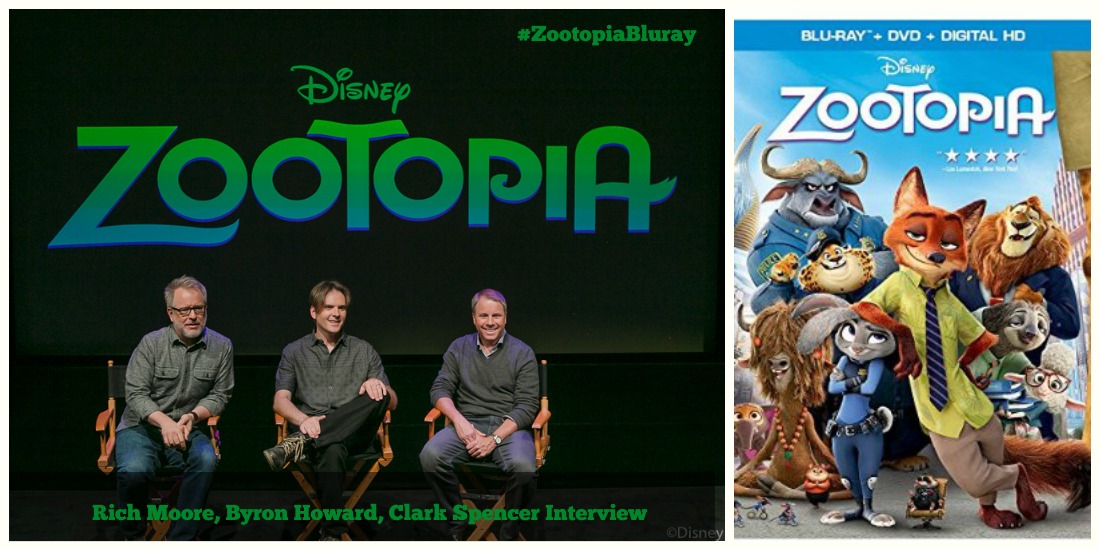
I have sat down with Zootopia’s Byron Howard, Rich Moore, and Clark Spencer a few times now to talk about working on the film. First, I sat down with them to talk about the making of the film before it’s release. Then I sat down with them again at the Orlando press junket of the film. These are three of the nicest guys, full of excitement as they share stories of working on Zootopia. After speaking to them in Orlando, I asked them about coming full circle, starting with an idea, doing their first bit of research at Disney’s Animal Kingdom, and now with the Blu-ray/DVD release, it’s really come full circle.
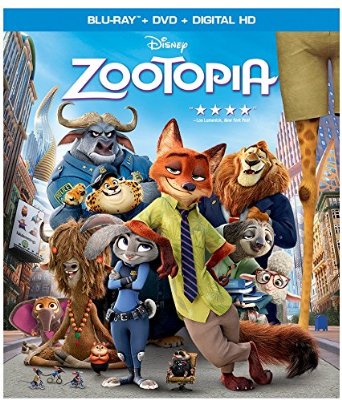
It was as refreshing to speak with them again for the third time as it was the first. And I loved knowing that the people at home can watch some of the things we were able to share of the movie making process in the extra bonus footage on the in-home release.
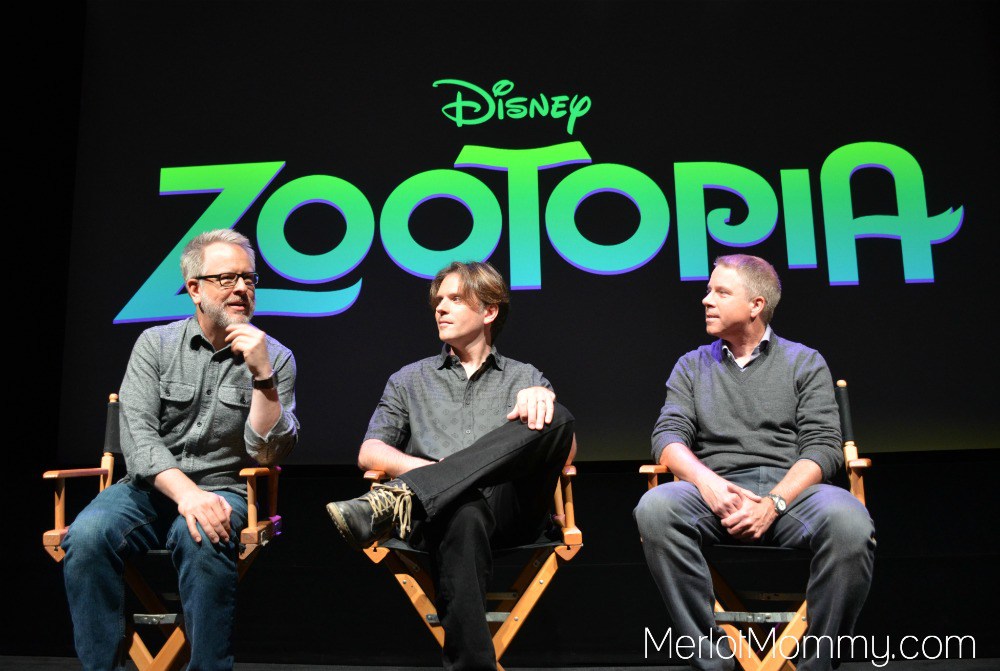
Photo Credit MerlotMommy.com
Zootopia’s Byron Howard, Rich Moore, and Clark Spencer Interview
So last time we met in Orlando, we spoke about coming full circle. Now that it’s been a huge success and the DVD is coming out, I guess this is more of the full circle?
Rich: It does feel like this is kind of the end of the road for it because, you know, …
It’ll be around forever.
Rich: But as far as like our involvement with it and promoting it’s a reflective time right now. It’s still out in markets in Japan and here and it feels great that this movie that we worked so hard on, that we believed in, that the studio looked at and said this is an important film, has been embraced so lovingly by the audience and the characters that we were very close to for – well Bryon, for a long time. And me for a few years and we’ve fallen in love with our characters. And to see the rest of the world, not just the US but like right now in Japan there are ladies in the audience that are like Nick would be such a great boyfriend, I’m in love with Nick. And it’s like really cool that people are seeing the things that we love about the movie, too.
Byron: It just goes beyond us so quickly and we spend a long time like Rich says with ourselves in rooms just talking about these ideas and hope will catch on but then see what people gravitate to in different countries, even the fact that “Zootopia” as a word — it’s not a thing. It was a weird word before that we made up and now it’s a thing that people know and just like you said like with Disney movies we’re very aware of this. We know that these things stay around forever which goes way beyond us and so we try to be very responsible about what movies are saying, about the qualities of the characters because we fall in love with the characters just as much as we hope the audience will and we try to as much as we can ourselves and what we love about our families and the world into these movies that people can relate and find something common no matter where, where they go. And going around the world was really educational for us because we just go to watch many, many different nationalities of people fall in love with the movie in different ways and that was really rewarding for us.
Was there anything that surprised you?
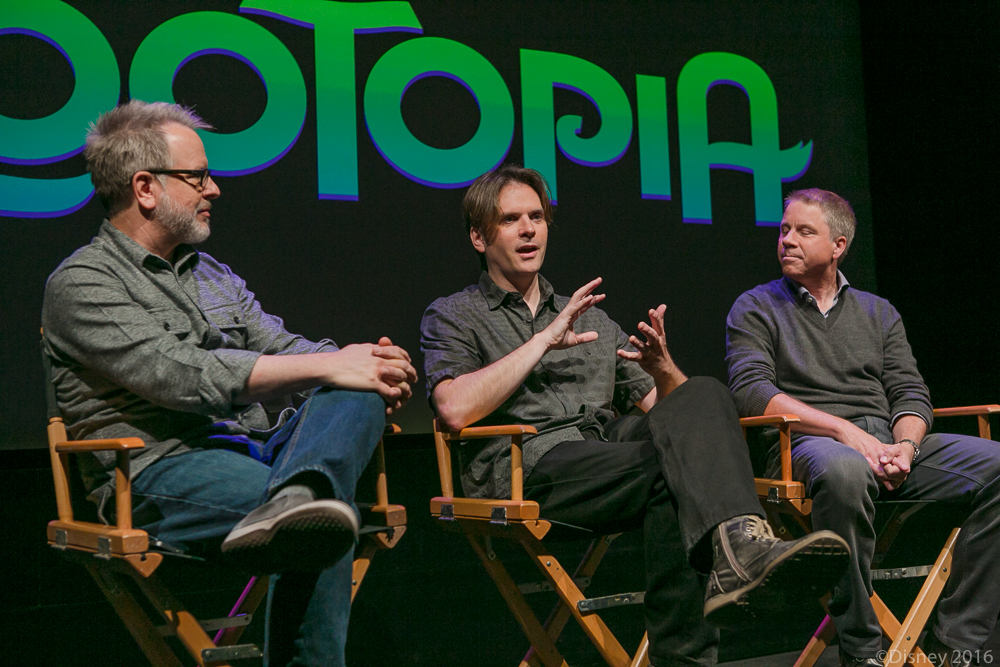
Rich: Well when we were making it about a year ago we have lots of like scary moments, you know, with like when Mr. Manchas jumps out. And we would see grown men in our audiences from our studio kind of previewing it oh, my god. Scared people. And at one point Clark was like man, are we gonna have to pull back on some of these because we had two pretty good ones. We wondered if we’re gonna have to pull back on those? Is it gonna be too scary? We decided to wait until the preview screening that we did in Arizona and I mean people ate it up. You know, it’s like little kids, the moms, the dads. They were like oh, my god. And afterward, they did like a small group asking kids and adults like what did you like about the movie? And overwhelmingly they were like, “I loved where you scared us”. That was so fun. That was so great. And it’s like wow, that would have terrified me as a little kid. I would have been out but it’s like kids love to be scared. It’s like the whole audience really loves those startles, you know. It’s like a thrill ride, I think. It’s like a roller coaster.
Clark: And Byron started talking about how in different parts of the world people respond to different things and it was amazing to kind of watch some people look at it and they think about the female bias. Some people look at it and they look at the empowerment of Judy as a character and they look at someone who’s trying to blaze that trail. One of the interesting thing for us was in China where the movie’s been huge but then it was that train ride. The train ride going into the city because in China right now there’s such a migration from the countryside to the big city and kids leaving their families and they do it by a train. And for them that was a really emotional moment in the film for the parents to let their daughters get on a train and go in the city and we knew that people might relate to that concept of having to let go of your child at certain point in time but not in the way that they did because of the fact that it was a train ride from the countryside into the city. I mean we never could have guessed that but it was one of the huge things and one of the reasons the movie performed was people could really relate to that on an emotional level and I think those are the things where when you’re making it you’re in it making the story that you see and then it’s fun to watch how the world sees that same story from their own perspective, their own lives.
So touching on the scary elements, some reviews feel that Disney is getting scarier and deals with death. How do you respond to that?
Byron: Well I think we were surprised and we thought it was actually great that we were talking about the subject that was so difficult because there’s so much stuff in the news over the last couple of years which has been about bias and tricky. We’re talking about the scary thing and the dark thing. I think we like that Disney can deal with real life emotions, things you’d experience. I think it’s going back to Bambi and Lion King. They were very mature ideas but in the way they were presented it’s something that it’s almost like a rite of passage seeing Bambi or seeing Lion King because Lion King was great with the families, allowing them to talk to their families about death and I think the same way with Zootopia. What we’d hoped is that it’s such a tricky subject to talk about bias but in crafting it in a way that the story isn’t a message movie but it comes to the experience of the characters and that you can relate to what Judy’s going through, you can relate to her struggle that people will find a way to relate to that within themselves. Rich and I’m new to Twitter, well as of like last year, and we’ve gotten so much positive feedback from people who have seen the film, both men and women, who relate to Judy and to Nick about different struggles in their own lives. It’s really rewarding for us to see that connect with people in a real way. So I think we always wanna make entertaining films but if it’s not about something real, if it’s not about something that really affects people then we’re not doing our job.
Rich: I think I invite those people who said watch Pinocchio or watch Snow White.
Byron: And we’re not gonna make a movie where we’re constantly trying to scare the audience over and over again. it’s like we will always temper it with a joke or we’ll take the tension high. Then we’ll kind of level out and I think that’s important because there can be scary moments but as long we put the audience especially the younger people in the audience back together again before we finish the film I think that’s a good thing because then you come out of that theater feeling — I remember when I was a kid feeling like, oh, my god, after seeing like Jungle Book, the original one, or Pinocchio and feeling like wow, I have been on a journey, but I made it back safe and I feel better about the world now and that’s kind of our job, It’s not to sugarcoat the beats of the movie but to temper them so it feels like you’ve experience something from young to old, but that we haven’t like broken you up and just kind of thrown to pieces into the street.
Can you talk about Shakira’s character and how she became involved in the project?
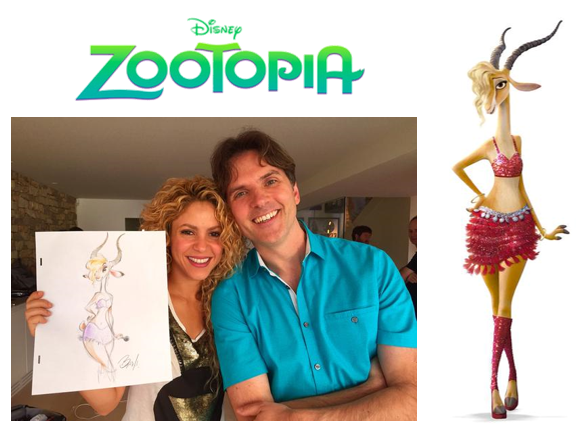
Clark: We talk about it really early when this character first came up, the Gazelle character. We kind of were thinking of her just as wouldn’t it be funny to have a pop star, a very famous pot star who’s very popular in this world and then Shakira came and talked to us and she was very nice. She listened to the pitch of the movie and we learned from meeting her in person how she’s very, very down to earth and very real and very super intelligent. She speaks six languages. She’s very socially aware and even in that one meeting where we just spend about an hour with her our opinion of what that character should be changed and we started to think about Gazelle as now being a sort of a symbol, a social symbol for the city representing everything that’s great that Judy expects the city to be when she gets there and it’s like that what you hope. She’s really kind of embodied and one of the reasons we went to Shakira in the first place is we thought world music is right in the pocket of what Shakira does so well is would be perfect for the movie. And one thing that we learned later on when we were recording with her in Barcelona which is amazing she has this amazing recording studio in Barcelona and she welcomed us all there but she told us that she related to Judy, because in Columbia where she grew up, she wanted to be a cop. She saw people being bullied and things happening around her that she wanted to correct and so there was something in her that was kind of meant to be in the movie and that’s remarkable when a voice talent and someone who can bring great music to a film but also have that sort of personal connection.
Rich: And you can tell that one went deep when she said I was just like Judy as a little girl because I hate bullies. I hated seeing criminals taking advantage of good people. I really wanted to do good in the world. It was like I really get this character. When a voice talent, a partner that is kind of diving that deep into the material, it’s just like only good can come of this.
ZOOTOPIA will be out on Blu-ray 6/7/2016
Facebook | Twitter | Instagram | Tumblr | Zootopia
- You Have to Remember – 9/11, 20 Years Later - September 11, 2021
- Creating the Perfect Look with a Maxi Dress - October 20, 2020
- Brand Better Giveaway - October 6, 2020


Leave a Reply